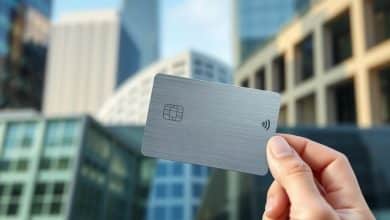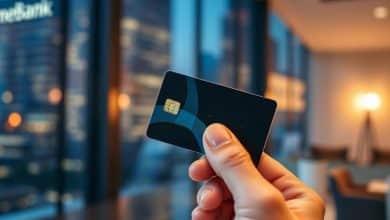Credit Card Usage: How to Manage Without Breaking Your Budget
Managing credit cards is key to a healthy financial life, especially in South Africa. Many people use credit for everyday needs and big purchases. Knowing how to use credit cards wisely can help you stay within your budget and avoid financial traps.
It’s important to understand that the minimum monthly payment is 2.5% of what you owe. Repayment periods for budget facilities can range from 3 to 60 months. This affects how much you pay each month and the total interest you’ll pay over time. Remember, interest starts right away on ‘straight’ credit purchases, so paying on time is crucial to avoid extra costs.
Smart financial tips for credit cards include knowing how purchases impact your credit limit and monthly balance. For example, buying travelers cheques or fuel can’t use budget facilities. This shows the need for careful spending. By following these tips, you can use your credit cards more wisely and achieve financial stability in the long run.
The Importance of Responsible Credit Card Usage
Knowing how to use credit cards right is key to managing your money well. They make it easy to buy things you need and handle everyday costs. If used correctly, they can even help you save money by offering up to 57 days without interest.
Understanding the Convenience of Credit
Credit cards make buying things easy because you don’t need cash. Many places accept them, making shopping quick and simple. Plus, you can earn rewards like cash back or points for your spending. But, it’s important to use them wisely to avoid high interest or too much debt.
The Role of Credit Cards in Budgeting
Credit cards are great for keeping track of your spending. They give you a monthly report of what you’ve bought. By paying off your balance fully each month, you can use them without extra fees. This way, you can improve your credit score and open up more financial opportunities later on.
Credit Card Spending Management Techniques
Managing credit card spending means knowing and changing your spending habits. It’s important to understand what you spend on. This helps you control your spending better.
Identifying Core Spending Habits
To manage your money better, you need to know your spending habits. Many people don’t check their spending closely. Setting financial goals helps you avoid overspending.
Here are some key strategies:
- Set monthly spending limits for different categories
- Determine what you really need versus what you want
- Make a budget that matches your short-term goals
These steps help you make smart financial choices.
Tracking Your Credit Card Expenses
Tracking your spending is also key to managing your credit card. You can use apps or keep a manual log. This helps you see where your money goes and make changes.
Here are some ways to track your spending:
- Use budgeting apps that connect to your credit card
- Keep a manual log of your daily buys
- Check your bank statements every month
By tracking your spending, you can make better choices. This helps you use your credit card wisely and stay financially responsible.
Budget-Friendly Credit Card Usage Strategies
Using a credit card wisely is key to keeping your finances in check. By using smart credit card strategies, you can manage your spending well. Knowing the difference between straight and budget payments is crucial for smart money choices.
For big purchases, budget facilities can be a big help. They let you spread out payments over time. This makes it easier to handle large costs without feeling overwhelmed.
Choosing Between Straight and Budget Payment Options
Choosing between straight and budget payments depends on your spending habits and goals. Straight payments mean paying off the full balance each month, avoiding interest. This is best for those who can stick to their budget without debt.
On the other hand, budget payments offer a structured way to pay back, especially for big expenses. They ensure regular payments over a set time. This helps avoid sudden financial shocks.
Using Budget Facilities for Large Expenses
Budget facilities are great for handling big costs. They offer flexible and easy repayment plans that straight payments can’t match. Using them wisely can improve your financial health.
Even with interest, these options can help manage large purchases. They allow for better financial planning by spreading out payments.
Credit Card Tips for Reducing Overspending
Overspending can be a big problem with credit cards. Taking practical steps can help you control your spending and reach your financial goals. Setting small goals is a good start, and knowing why you spend can help you spend better.
Setting Small and Manageable Goals
Creating realistic financial goals is key to spending less. Start by making a detailed monthly budget. It will show you where your money goes and help you cut unnecessary costs.
- Set spending limits for budget categories.
- Use alerts for when you hit certain spending amounts, like $200 or $500.
- Wait 72 hours before buying something big to avoid impulse purchases.
If you have many debts, focus on paying off high-interest credit cards first. You might also consider debt consolidation loans. Moving balances to a card with lower interest can help too.
The Dangers of Emotional Spending
It’s important to understand why you spend emotionally. Emotional spending can lead to debt, especially with tempting rewards programs. These can make you spend more to earn points or cash back.
Getting help is a good idea. Talk to your credit card company about payment plans or seek advice from credit counseling agencies. Building good financial habits, like saving for emergencies, is also crucial.
How to Avoid Credit Card Debt
Managing credit card debt is key to staying financially healthy. Not controlling spending and only paying the minimum can lead to a lot of debt. Knowing the risks of just paying the minimum can help avoid big problems.
The Risks of Paying Only the Minimum
Many people don’t realize the minimum payments risks of credit cards. When you only pay the minimum, the debt grows because of interest. This creates a never-ending cycle of debt.
The interest on what you owe can add up a lot over time. This makes it hard to pay off balances. If you have debt on many cards and only pay the minimum, you could face a big financial problem.
Creating a Plan to Pay Off Outstanding Balances
To fight credit card debt, you need a good repayment plan. Here are some ways to avoid credit card debt:
- Snowball Strategy: Start by paying off the card with the smallest balance first. Then, use that money to pay off the next smallest balance.
- Avalanche Strategy: Pay off the card with the highest interest rate first. This way, you save money on interest.
- Lasso Strategy: Combine debt from different cards into one. This can make payments easier and might get you a lower interest rate.
A good way to manage debt is to make a budget and watch your spending closely. Take credit cards out of easy reach to stop impulse buys. Using cash instead can help you see where your money is going, making it easier to pay off balances. If debt is really bad, getting help from a credit counselor can be very helpful.
Smart Credit Card Usage: When to Use Your Card
Knowing when to use a credit card is key to smart usage. Making smart choices when you buy things helps your wallet and lets you earn rewards. By picking the right times to use your card, you can get the most benefits without getting into debt.
Making Informed Purchases
When you think about smart buying, choose credit cards with perks. Use them for things you really need or have planned. This way, you avoid buying things you don’t need, which can lead to debt.
Maximizing Benefits: Rewards and Points
Many cards give rewards or points for every buy. To get the most out of these, pick a card that fits your spending style. Rewards like cashback, airline miles, or retail points can save you money if you use your card for everyday things. Just remember, keep your credit use under 30% to keep your score healthy.
Understanding Interest Rates and Fees
Credit cards have different interest rates and fees that can affect your money. It’s important to know these details to use your credit card smartly. The average APR of credit cards is 24.74% as of September 2024. Interest rates change based on the prime rate.
It’s key to be aware of these rates, especially if you carry a balance. The costs can add up fast.
The Cost of Carrying a Balance
Carrying a balance on a credit card can be very costly. When you only pay the minimum, most of that goes to interest, not the principal. For example, paying off a $2,000 balance over 15 years with minimum payments could cost around $4,241. About $2,241 of that is interest.
This shows why paying more than the minimum is important. It helps lower the interest costs you pay.
Comparing Different Credit Card Offers
When looking at credit card offers, check the interest rates, annual fees, and rewards. Each card has its own terms and conditions. This affects your long-term financial plans.
Some cards offer lower APRs for a short time, making them appealing. It’s smart to compare several offers. Think about your financial goals and choose a card that saves you money while offering rewards. By researching well, you can find a card that fits your financial needs.
Tips for Enhancing Your Credit Score
Keeping a good credit score is key to your financial health. Using credit cards wisely is a big part of this. It’s important to keep your balances low and pay on time.
Maintaining Low Credit Balances
Using less than 30% of your available credit is a good rule. This helps your credit score a lot. It’s because it makes up 30% of your FICO score.
By managing your credit well, you can boost your score. This also helps you get better loan deals later on.
Consistent On-time Payments
How you pay your bills is the biggest part of your credit score. It’s 35% of your FICO score. Paying on time shows you’re reliable and lowers your credit risk.
Missing payments can hurt your score for years. It makes it harder to get loans. But, paying on time can save you money in the long run.
Conclusion
Managing credit cards well is key to being financially disciplined and living without debt. This article has shown how smart spending choices can lead to a stable financial future. Using credit cards wisely can bring rewards and better credit scores, opening doors to future loans.
It’s important to track expenses, set spending limits, and know all the benefits of credit cards. These steps help build a healthy relationship with credit. They ensure you get the benefits of credit cards without the downsides. Always keep in mind that smart spending and low balances are crucial.
Being disciplined with credit cards can greatly improve your financial health. Paying on time and watching your spending can help you enjoy credit card perks without debt. Following these tips is essential for achieving long-term financial stability.
FAQ
How can I manage my credit card usage without breaking my budget?
What are some tips for responsible credit card usage?
How can I track my credit card expenses effectively?
What is the difference between straight and budget payment options?
How can I prevent emotional spending with my credit card?
What risks are associated with making only minimum payments on credit cards?
When is it smart to use my credit card?
How do interest rates and fees affect my overall credit card costs?
What steps can I take to enhance my credit score?
Published on: 19 de August de 2024

Bakari Romano
Bakari Romano is a finance and investment expert with a strong background in administration. As a dedicated professional, Bakari is passionate about sharing his knowledge to empower individuals in managing their finances effectively. Driven by this mission, he founded FinancasPro.com, where he provides insightful and practical advice to help people make informed financial decisions. Through his work on the site, Bakari continues to make finance accessible and understandable, bridging the gap between expert knowledge and everyday financial needs.






